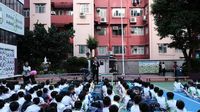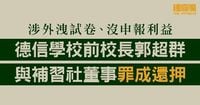In a shocking case that has rocked the local education community, former principal of Tak Sun School, Kwok Chiu-wan, and Fong Kit-fong, a director of the Beacon Learning Centre, were found guilty of misconduct in public office and conspiracy to commit misconduct. The verdict was delivered on April 30, 2025, at the District Court, where both defendants were immediately remanded in custody pending sentencing.
The prosecution outlined a troubling narrative of a close relationship between the two, which began when Fong's son attended Tak Sun School. The pair reportedly traveled together seven times over six years and communicated frequently, with over 600 phone calls in just one year. This relationship raised eyebrows, especially given the allegations that Kwok leaked confidential exam questions to Fong.
Evidence presented during the trial revealed that between 2019 and 2021, Kwok sent Fong multiple exam papers, including three Chinese and eight English test papers, via WhatsApp. In May 2021, he accessed the school’s system and copied files containing exam questions to an external memory device, which was later connected to the tutoring center's computer.
As a result of these actions, the Primary Five students at Tak Sun School had their attainment test results invalidated, necessitating a re-examination in September 2021. This incident not only disrupted the students' academic progress but also called into question the integrity of the school's administration.
The court also heard that Kwok had borrowed HK$420,000 from his mother, which he transferred to Fong's account to facilitate her operations at Beacon Learning Centre. This financial connection was a significant factor in the legal proceedings, as Kwok failed to disclose his financial interest in the tutoring center to the school board, constituting a clear conflict of interest.
Judge David Siu, in his ruling, emphasized the severity of Kwok's misconduct, stating, "Even a child knows that leaking exam questions before an exam is dishonest." He pointed out that Kwok had abused the trust placed in him as the principal, compromising the integrity of the educational institution.
Fong, while not a public servant, was found to have actively solicited exam papers from Kwok. The judge noted that she was aware of the confidentiality of the materials and continued to request them, thereby participating in the misconduct. The court found that both defendants conspired to leak the exam questions, which amounted to cheating.
During the trial, Kwok maintained that he and Fong were merely friends and claimed ignorance regarding the implications of his financial dealings with her. However, his explanations were met with skepticism by the judge. Kwok's claims that he did not know how the HK$420,000 would be used were dismissed as implausible, particularly given the context of their relationship.
Evidence included WhatsApp messages between the two, in which Fong expressed gratitude towards Kwok for his assistance, saying, "So lucky to have you," indicating a level of intimacy beyond mere friendship. The judge highlighted that the nature of their relationship was inconsistent with Kwok's assertions of innocence.
Furthermore, the court noted that Kwok had previously reported to the school that he was attending student birthday parties and had made purchases at stores run by former students, demonstrating his awareness of the potential for conflicts of interest. Yet, he failed to report his financial ties to Beacon Learning Centre, which was located near Tak Sun School and catered primarily to its students.
In light of the evidence presented, the judge ruled that Kwok's actions were not only improper but also constituted a serious breach of trust that undermined public confidence in the educational system. He stated, "Kwok seriously abused the school's trust in him, committing crimes for the benefit of himself, Fong, and Beacon."
The case has prompted discussions about the integrity of educational institutions and the importance of transparency among school officials. The Independent Commission Against Corruption (ICAC) emphasized the high expectations that parents and the community have for school leaders, underscoring the need for stringent measures to prevent such misconduct in the future.
The sentencing for both defendants is scheduled for July 10, 2025, during which the court will determine the appropriate penalties for their actions. The outcome of this case serves as a reminder of the critical role that ethics and accountability play in education, particularly in maintaining the trust of students and parents alike.





